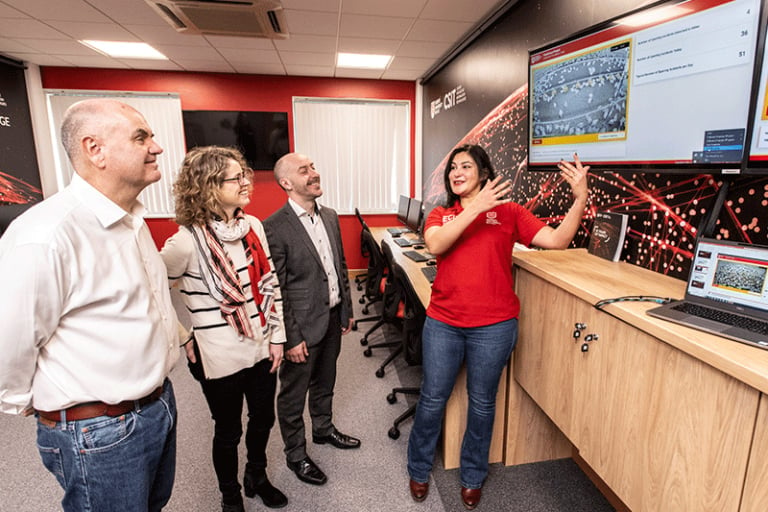June 10, 2025 | 17:18 GMT +7
June 10, 2025 | 17:18 GMT +7
Hotline: 0913.378.918
June 10, 2025 | 17:18 GMT +7
Hotline: 0913.378.918

FlockFocus can monitor feeding behaviour and the distribution of birds in key areas of the chicken house. Photo supplied.
Real-time monitoring by automating and tracking key welfare indications, such as behaviour, gait and vocalisation, is increasingly being tested, as witnessed through the SMART Broiler programme. Launched in 2019, the public-private partnership has invested $2 million to develop technology to objectively monitor birds on commercial farms.
And now the Foundation for Food and Agriculture Research (FFAR) and McDonalds have awarded a further US$670,000 to two SMART projects in the UK.
Professor Niamh O’Connell, animal welfare expert at The Institute of Global Food Security at Queens University, Belfast, is receiving nearly US$400,000 to transfer intelligent surveillance techniques for tracking humans to provide real monitoring of individual birds within a flock.
The camera-based technology, FlockFocus, can automatically monitor and track activity patterns and the weight of individual birds within large flocks on commercial farms.
The development phase has benefitted the expertise of CattleEye, the world’s first hardware-independent autonomous livestock monitoring platform, focusing on data integrated, use-case development and system management.
FlockFocus can also monitor feeding behaviour and the distribution of birds in key areas of the chicken house. This technology can potentially improve animal welfare in other sectors, as well.
The project has been undergoing trails with key industry players, such as Moy Park and additional partners in Hungary and the US, with the aim to perfect the transformative technology.
The second grant has been given to Professor Marian Dawkins, Emeritus Professor of Animal Behaviour at the University of Oxford to extend testing of a novel camera and computer systems, Optiflock.
Funding totalling US$270,000 has been given to development of the system, which automatically monitors the behaviours of broiler chickens around the clock to deliver real-time information on key welfare indicators, such as mortality, walking ability, leg health and infection.
The tool uses inexpensive and commercially available closed-circuit television cameras linked to small on-farm computers.
Prof Dawkins says smart farming, with its combination of sensors, computer-based decision-making and targeted intervention, could improve animal welfare: “Technology has the potential to optimise living conditions for animals, save labour costs, detect and treat disease at an early stage, minimise waste and lead to higher farm incomes. Properly implemented, it could lead to genuine improvements in animal welfare, resulting in animals having healthier environments and new opportunities to do behaviour that is important to them.”
Dr Jasmin Bruno, FFAR scientific programme director, said the technology had the potential to be a win-win for poultry farmers: “Investing in precision agriculture research allows us to harness advanced technologies – like sensors, robotics and predictive analytics – to monitor animal welfare in real time.”
Janet Helms, McDonalds’ global sustainable sourcing animal health and welfare senior manager, added: “Through the commercialisation and scale of SMART Broiler solutions, McDonald’s and integrators alike can anticipate improvements to their key welfare indicators and overall progress towards their respective animal welfare initiative. The ability to accurately measure and demonstrate improvement in welfare and behavioural outcomes becomes a potential differentiator in a commodity market.”
(Poultryworld)

(VAN) Dr. Le Van Nguyen, Director of the Institute of E-Commerce Management (ECM), emphasizes the potential for green development through the cultivation of fruit trees, particularly in provinces such as Son La.

(VAN) VAAS and numerous Vietnamese enterprises have signed cooperation agreements with Japanese partners to promote agricultural technology and trade connectivity.
/2025/05/29/5625-12-214801_567.jpg)
(VAN) Provincial mergers in the Mekong Delta promise to streamline administration, expand inter-provincial raw material areas, and foster close linkages in agricultural value chains, benefiting both businesses and cooperatives.

(VAN) Merging Mekong Delta provinces contributes to the expansion of agricultural raw material areas, addressing previous constraints caused by provincial boundaries. Additionally, this expansion will reduce costs and strengthen linkages between businesses, cooperatives, and farmers.
/2025/05/29/1043-2-153730_145.jpg)
(VAN) The Government's policy to merge provincial-level administrative units opens up major opportunities for the Mekong Delta region to reshape its agricultural development strategy toward large-scale production, effective regional linkages, and sustainability.

(VAN) The mutual export of agrifood products between the European Union (EU) and the United Kingdom (UK) must occur again without certification, border controls or other red tape. This was agreed at the UK-EU summit.
/2025/05/22/5121-2-173645_677.jpg)
(VAN) NBSAP Tracker identifies strengths and areas for improvement in the National Biodiversity Strategy, based on each region’s priorities and capacities.